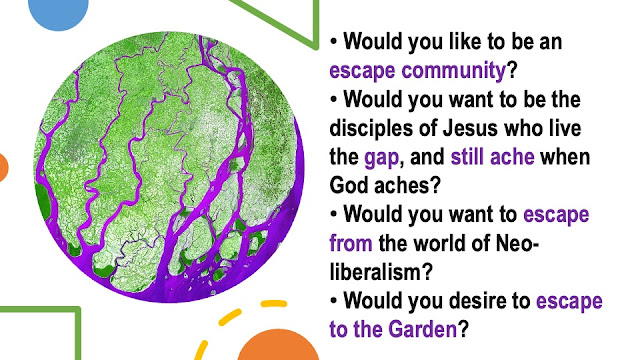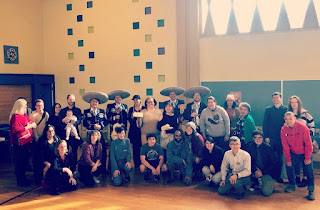Sermon: Back to the Garden (Genesis 2:1-17)

In 2014, I saw a magnificent, beautiful place. When someone asks me if I have experienced any place that reminds me of Eden, the original garden, this image and memory comes to mind. That summer, my family travelled on a long road trip, leaving our Vancouver Island home to move to Winnipeg. One of our first destinations, after Revelstoke’s wonder, was Yoho National Park. The river that flows there is an emerald or light blue jade, milky with the glacial till that gives the river its unique and distinctive colour.
It’s stunning to read how Genesis tells the origin story with a river. The author seems passionate about illustrating how the river nurtures the world and the land, and therefore creates human’s internal relation with it. It was the ‘wet’ mud that God used to form the first “earthling" (Adam).
If I tell this Genesis origin story of ‘river mapping’ in my own words, I would sing: “And suddenly a river of water gushes out of the earth and flows out of Eden and waters the garden. The river wets what is dry, and flows around the land, and the land yields many beautiful and precious things, such as gold, spices, and precious stones. The original river becomes four. The characteristics and shapes of these rivers change depending on how each stream of life flows, depending on which terrain, which region, and around which land it bends. The narrator gives the names of all four rivers: Pishon, Gihon, Tigris, and Euphrates. What this could mean for us is that when God creates us, God forms us like a river.
Not just one river, not the same river, but just as four rivers and more rivers branching out to multiply, which makes the river topography of each one of us complex, varied, stunning with many shapes and names. This is us. We all have a unique appearance, winding paths, precious stones — “gold”, “onyx” —. Rivers spread dizzyingly along their ever-changing stem. It is God’s blessing that our existence, just like a river, is so free, diverse and multi-layered. This diversity, the expansiveness that can’t be dictated or regulated, is God’s irrevocable original blessing.
Walter Brueggemann, one of the most influential Old Testament scholars, especially on Hebrew prophetic tradition, affirms that the primary concerns of the people who have written this origin story in Genesis are nothing to do with “sin/death/evil/sex/fall”. (It’s also not about “apples and snakes.”) Brueggemann is absolutely clear about what today’s story is not about. Then, what is this origin story really about or can be, for us, living in the 21st century?
Here, I would like to invite you to stand with me and Eve and Adam under the tree of knowledge. It is the tree of knowledge of good and evil. What is good? What is evil?
The Tree of knowledge is internally concerned with ‘possession.’ It is about the desire of “What is good” or “What looks good” to take, acquire, and possess. Then, in order to maintain the power to keep ‘what is good’, and to justify it, inevitably, the opposite consciousness needs to be created, which is to know “What is not good.” The extreme version of “What is not good” is not just ‘bad’, but what is evil. For example, let’s think about the Doctrine of Discovery. The Doctrine of Discovery is a legal concept that originated in European Christian theology seven centuries ago; it has been used to justify the colonization and seizure of land from non-Christian peoples since the Age of Exploration. It is based on the claim that land that is not occupied by Christians is declared ‘empty’, and it has become the legal foundation for colonization and the dispossession of Indigenous peoples in the Americas and other parts of the world. Historically, it has been used to justify the removal, enslavement, and genocide of Indigenous peoples around the world. The Doctrine of Discovery is forged falsely for land possession. Land is good. More land is even better. To possess it, and to justify it, the Indigenous peoples and their way of life had to be not good, be wrong, be inferior, be less worthy, and even be evil.
To prepare this Sunday’s reflection, I picked up a book from my top bookshelf, The Tower of Babel and Wanderers, written by Rev. Dong Hwan Moon. Rev. Ik Hwan Moon, who wrote the hymn “With the Wings of Our Mind (VU 698)”, the prophet and poet of the Korean democratic movement, is his older brother. I met the younger Rev. Moon at the celebration service for the 60th anniversary of the Presbyterian Church of the Republic of Korea, from which Min-Goo came from and was ordained. I saw this old man walking up to the pulpit, relying on his cane and also being helped by a youth — this 90-year-old, shrunken, frail person — then he preached like thunder!
The title of his sermon was “The Escape to the Garden of Eden.”
Moon presented what needs to be understood as truly being evil. He lashed out against the evils being done in the name of the Neo-liberalism that unleashes the tyranny of free trade and free markets. He said it is our Tower of Babel. This Tower of Babel tells us that ‘possessing more’ equals more happiness, so ‘produce more and consume more.’ Moon lived through severe trials of his own, including two terms of imprisonment, while he worked to free Korea from autocratic military rule. In his sermon, he said he now realizes that the point of his life’s work was not only Korea’s urgent need of democracy but to fight the evils of neo-liberalism. It opens the way for military dictatorships to rob their own people of power in order to make their countries join the ranks of advanced nations. It opens the way for advanced nations to ignore valid concerns about water and air pollution in order to create more tax revenue and make the wealthy even wealthier.
Moon says only when we experience and realize evil as an evil would we dream to escape from the evil. Escape to the Garden. In Judaic/Christian faith, the first community God intended for us was the escape community, to live as if, dream as if, we escape to the Garden of Eden, right here, in the beast of Neo-liberalism. If there is a gap between how much we can live up to God’s vision/our ideal and the reality/the weight of life, then, live “the gap”! Strive to be the Gap community!
I can’t forget the determined voice and the anxious face of Rev. Dong Hwan Moon when he said in his sermon, ‘God aches. What’s important is that God aches. If we are not aching, we are not the disciples of Jesus.”
Live the invitation to prioritize the Gospel over the dominant economic narrative.
And yet, it’s ok. Live the gap to the extent of how much you can do.
Sheryl Johnson, in her first and amazingly prophetic book, Serving Money, Serving God, identifies twelve values and beliefs (idols) that underlie many Christians’ stewardship practices. These are rooted in aspects of neoliberalism, and she says, I call them “idols” because they are both cherished and false.
Warning… It is fascinating, and at the same time, once you hear it, it can haunt you…
The first idol is What’s Mine is Mine.
The idea that what is in my possession, “my property”, belongs to me and that I can use it however I please is so fundamental in our society that we have difficulty even considering an alternative.
Johnson writes… We need to ask, What is actually “mine?” We need to ask where our “property” originates and who has been harmed all along the way as it has come into our lives… When I look at my life and my personal finances, I realize how much of what I have is the result of white privilege, my privileged socioeconomic class, my life in the Global North, and devastating processes that are impacting other people and species, the Earth and future generations…
If we live and build churches on traditional Indigenous territory and in gentrified or predominantly white communities, we profit and benefit from the land, its location, and these systems. For example, How have colonial and racist systems of migration and neighbourhood development enhanced the value of our property..?
There are so many fascinating questions here. By only quoting a few, I cannot do justice to this incredibly relevant book. I highly recommend it to you.
The beginning and the end of this sermon don’t seem to match; I started it with “Oh, I saw a magnificent and beautiful place in 2014.” and I am ending it with “So, what is actually mine?” But if you think about it, those two things match up. We strive to live in a world where we can love what we see, and also refuse to keep it for ourselves alone.
The questions of What is mine/what is ours/what should belong to all invites us to ponder…
- Would you like to be an escape community?
- Would you want to be the disciples of Jesus who live the gap, and still ache when God aches?
- Would you want to escape from the world of Neo-liberalism?
- Would you desire to escape to the Garden?
Friends, you are the River, part of God’s original blessing. The precious stones that you hold in your river — the gold, the onyx — belong to the magnificent beauty and dignity of God in you, not to the exploitation at the expense of the powerless that allows inequality. As my friend said, inequality is a spiritual problem.
Here are the last verses of Woodstock by Joni Mitchell… to wrap up this sermon of opposites:
Above our nation
We are stardust
We are golden
And we've got to get ourselves
Back to the garden (Woodstock, Joni Mitchell)
 |
| Laura Giffen, The Tree Ring Mandala... Each Lenten week, a new ring is added. |








%5EJ%202023.jpg)
